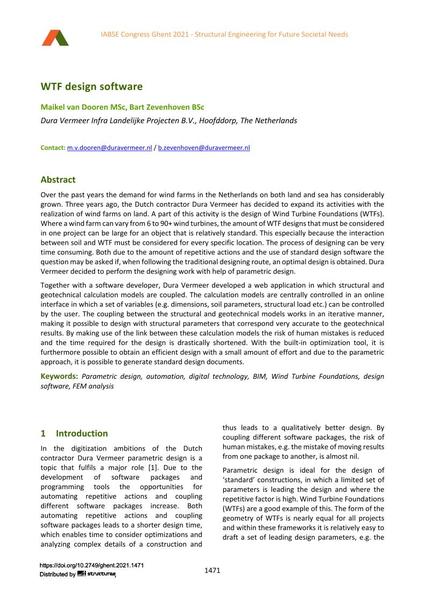WTF design software

|
|
|||||||||||
Détails bibliographiques
| Auteur(s): |
Maikel van Dooren
(Dura Vermeer Infra Landelijke Projecten B.V., Hoofddorp, The Netherlands)
Bart Zevenhoven (Dura Vermeer Infra Landelijke Projecten B.V., Hoofddorp, The Netherlands) |
||||
|---|---|---|---|---|---|
| Médium: | papier de conférence | ||||
| Langue(s): | anglais | ||||
| Conférence: | IABSE Congress: Structural Engineering for Future Societal Needs, Ghent, Belgium, 22-24 September 2021 | ||||
| Publié dans: | IABSE Congress Ghent 2021 | ||||
|
|||||
| Page(s): | 1471-1477 | ||||
| Nombre total de pages (du PDF): | 7 | ||||
| DOI: | 10.2749/ghent.2021.1471 | ||||
| Abstrait: |
Over the past years the demand for wind farms in the Netherlands on both land and sea has considerably grown. Three years ago, the Dutch contractor Dura Vermeer has decided to expand its activities with the realization of wind farms on land. A part of this activity is the design of Wind Turbine Foundations (WTFs). Where a wind farm can vary from 6 to 90+ wind turbines, the amount of WTF designs that must be considered in one project can be large for an object that is relatively standard. This especially because the interaction between soil and WTF must be considered for every specific location. The process of designing can be very time consuming. Both due to the amount of repetitive actions and the use of standard design software the question may be asked if, when following the traditional designing route, an optimal design is obtained. Dura Vermeer decided to perform the designing work with help of parametric design. Together with a software developer, Dura Vermeer developed a web application in which structural and geotechnical calculation models are coupled. The calculation models are centrally controlled in an online interface in which a set of variables (e.g. dimensions, soil parameters, structural load etc.) can be controlled by the user. The coupling between the structural and geotechnical models works in an iterative manner, making it possible to design with structural parameters that correspond very accurate to the geotechnical results. By making use of the link between these calculation models the risk of human mistakes is reduced and the time required for the design is drastically shortened. With the built-in optimization tool, it is furthermore possible to obtain an efficient design with a small amount of effort and due to the parametric approach, it is possible to generate standard design documents. |
||||
| Mots-clé: |
BIM
|
||||
| Copyright: | © 2021 International Association for Bridge and Structural Engineering (IABSE) | ||||
| License: | Cette oeuvre ne peut être utilisée sans la permission de l'auteur ou détenteur des droits. |
||||
